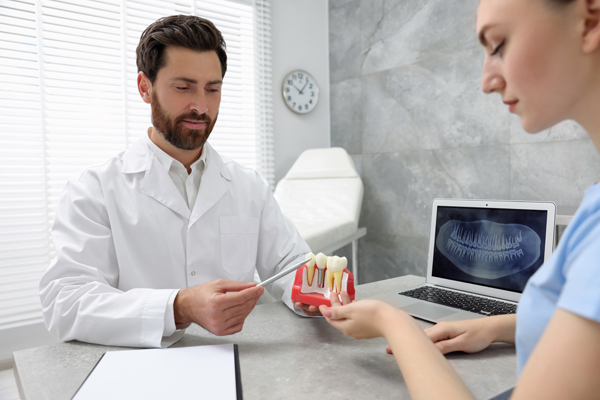Consider Dental Implants for Replacing a Missing Tooth

When it comes to restoring lost teeth, a dental implant is the most natural and durable option available. However, you might find yourself wondering if it is the best option for you. If you have gaps in your smile due to tooth loss, want to get a dental bridge but do not want to harm the good teeth on either side of the gap, are concerned about bone loss, or have dentures that do not fit well, getting dental implants should be on at the top of your dental to-do list.
Why get dental implants?
The following are reasons to consider dental implants to replace a lost tooth.
Dental implants are natural-looking dental restorations
Any restoration's aesthetic appearance is a crucial factor to consider. Options like bridges and dentures are all natural-looking, but dental implants are the closest things to natural teeth available. Considering that the support for the tooth prosthetic comes from the implant embedded inside the jaw, it will be impossible to notice them.
Dental implants function like natural teeth
Since dental implants are implanted in the jawbone, the bone surrounding them ossifies to keep them stable. Therefore, dental implants are almost as strong as natural teeth. Patients can eat their favorite meals, especially those they would have had to avoid while wearing dentures. The dental implant can also restore the lost teeth's function completely. Patients will perform all oral functions without discomfort or any concern about a gap between their teeth.
Dental implants are durable
When properly cared for, dental implants can endure many years, if not a lifetime. Maintenance for dental implants is no different from natural teeth: brushing teeth twice a day, flossing once a day, and regularly visiting the dentist and hygienist.
Dental implants help prevent bone loss
Bone loss is an unpleasant effect of tooth loss. To maintain its shape and density, the alveolar bone surrounding and supporting the teeth needs stimulation from the teeth themselves. Since the stimulation is lost due to the missing teeth, the bones begin to recede. The jawbone may lose strength, definition, and function as it deteriorates. Dental implants stimulate the alveolar bone in the same manner as natural teeth. This may help preserve the face's underlying structure and wellness.
Dental implants are safe and biocompatible
Dental implants have a good safety record, but they must always be placed by a highly educated, certified, and experienced dentist. Dental implant success rates vary based on their location, but they generally have a success rate of up to 95%.
Dental implants do not harm nearby teeth
One disadvantage of a dental bridge is that the dentist needs to alter the healthy teeth on either side of the gap to establish an anchor for the replacement tooth. These teeth may deteriorate with time, making it difficult to expand the gap anymore, and partial dentures become the next option. Dental implants are embedded inside the jawbone and do not affect the nearby healthy teeth.
In conclusion
Many patients feel self-conscious about their missing teeth or that having dentures makes them feel insecure. Getting dental implants can restore the appearance, function, and appeal of the smile.
Request an appointment here: https://www.yourfamilysmiles.com or call Family Dental Care of Chicago at (773) 250-1194 for an appointment in our Chicago office.
Check out what others are saying about our dental services on Yelp: Dental Implants in Chicago, IL.
Recent Posts
Choosing dental implants is a great idea if you are looking into your tooth-replacement options because you are missing one or more of your teeth. This option is one that offers benefits that other replacement options do not, which is why so many patients are choosing implants to replace their missing teeth. Other replacement options…
Dental implants are the best way to fill in the gaps from missing teeth. Missing teeth cause a number of oral health issues, including making it harder to chew and altering the structure of the other teeth. However, dental implants are not suitable for all patients. You must have healthy teeth and gums, good oral…
Considering dental implants? No one should have to live with missing teeth that cause cosmetic or oral health concerns, and dental implants help many replace missing teeth and regain confidence in their smile. Along with the cosmetic benefits, many find better oral health, improved function and other advantages with dental implants.There are many benefits dental…
Gold dental crowns are a type of restoration that sits over the entirety of a severely decayed or damaged tooth. The purpose of these restorations is to provide much-needed support and protection to weakened teeth. Today, dental crowns come in a variety of materials, but once upon a time, gold was one of just a…


